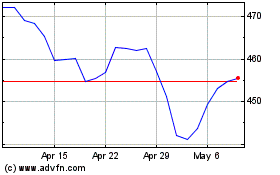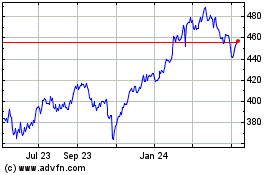RushCard, Mastercard Fined Over 2015 Customer Lockout -- Update
February 01 2017 - 5:03PM
Dow Jones News
By Yuka Hayashi
WASHINGTON -- UniRush LLC and a unit of Mastercard International
Inc. agreed to settle accusations that "preventable failures"
caused a 2015 debacle in which tens of thousands of customers lost
access to their money stored on prepaid cards, setting off a
cascade of unpaid bills and other personal-finance crunches.
The Consumer Financial Protection Bureau said Wednesday the two
companies are paying about $10 million to customers affected by the
temporary lockup of their accounts, triggered by a technical
glitch. The companies are also paying a civil penalty of $3
million.
UniRush is the parent company of RushCard, a major prepaid-card
business founded by hip-hop producer Russell Simmons . Mastercard
Payment Transaction Services, a unit of Mastercard International,
is RushCard's payment processor. The glitch occurred as RushCard
was switching to using Mastercard from another provider.
The settlement came two days after Green Dot Corp., a leading
prepaid-card company, said it reached a deal to buy UniRush for
$147 million.
The incident caused severe disruptions for customers, many of
whom use prepaid cards for basic financial services including
direct deposit of paychecks and government benefits as well as
making purchases and paying bills. As customers were shut out of
their accounts for days, and in some cases for weeks, some took to
social media to air their grievances, complaining that they didn't
have money to pay for basic necessities or they were hit with late
fees on unpaid bills. Many prepaid-card customers are "unbanked" or
"underbanked," meaning they have no or limited access to regular
banking services such as checking accounts and credit and debit
cards.
"All of this stemmed from a series of failures that should have
been anticipated and prevented," CFPB Director Richard Cordray said
on a conference call. These failures, he said, "caused serious
problems for the financial lives of many customers."
RushCard said it welcomed the settlement with the CFPB but it
didn't admit any wrongdoing. "Since the event in 2015, we believe
we have fully compensated all of our customers for any
inconvenience they may have suffered," a company representative
said. The company settled a class-action lawsuit with customers
last year that included reimbursement of $20 million. Mr. Simmons
described the incident as "the most challenging periods in my
professional career" and thanked customers for remaining loyal.
"We are pleased to bring this matter to a close, allowing us to
further enhance the best practices, policies and procedures for
prepaid cards," a Mastercard spokesman said. He added that the
company understands "the critical role prepaid cards play in how
people manage their money."
The RushCard settlement is part of the CFPB's scrutiny of the
prepaid-card industry, a segment that has grown rapidly in recent
years. The bureau last year finalized a new rule to bring oversight
of the sector closer to regulations covering banks.
New payment technologies have elevated prepaid cards into
popular financial-management tools rivaling bank checking accounts.
Nearly 10% of U.S. households used such cards in 2015, according to
a study by the Federal Deposit Insurance Corp.
The CFPB alleged that in October 2015, as RushCard was switching
to Mastercard as payment processor, UniRush failed to transfer all
customer accounts to Mastercard accurately and delayed processing
direct deposits for more than 45,000 consumers. It also failed to
provide customer service properly to those affected by the
lockup.
Mastercard, according to the CFPB, didn't make sure it was
sending accurate information about customers' accounts to
UniRush.
The RushCard settlement is the latest action in a spree of
enforcement activities by the CFPB in recent weeks, a move industry
experts attribute to the bureau's desire to get done as much work
as possible amid concern that the new Republican administration
will move to constrain its authority. Mr. Cordray said in an
interview last week at a WSJ Pro Financial Regulation event that
the bureau's enforcement work would continue at a "steady and
vigorous" pace, and warned some major cases were still in the
pipeline.
Since the beginning of January, the CFPB made eight
announcements of enforcement actions, including a high-profile
lawsuit filed against Navient Corp. , the nation's largest
student-loan servicer, for allegedly obstructing repayments from
customers. Navient denies the accusations.
Write to Yuka Hayashi at yuka.hayashi@wsj.com
(END) Dow Jones Newswires
February 01, 2017 16:48 ET (21:48 GMT)
Copyright (c) 2017 Dow Jones & Company, Inc.
MasterCard (NYSE:MA)
Historical Stock Chart
From Mar 2024 to Apr 2024

MasterCard (NYSE:MA)
Historical Stock Chart
From Apr 2023 to Apr 2024
